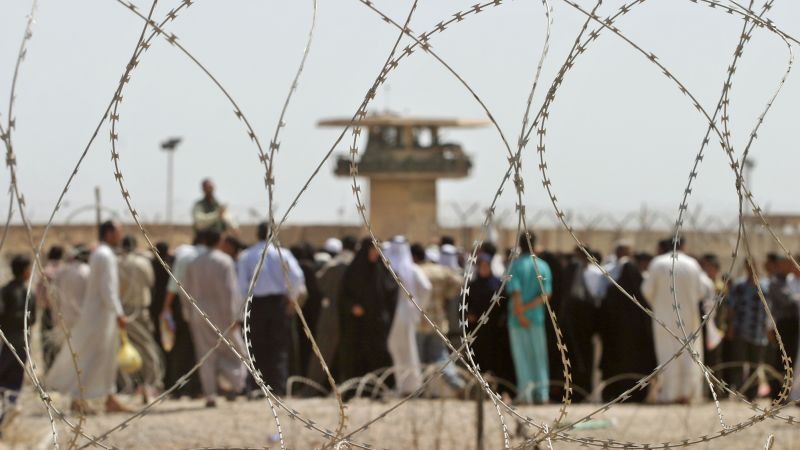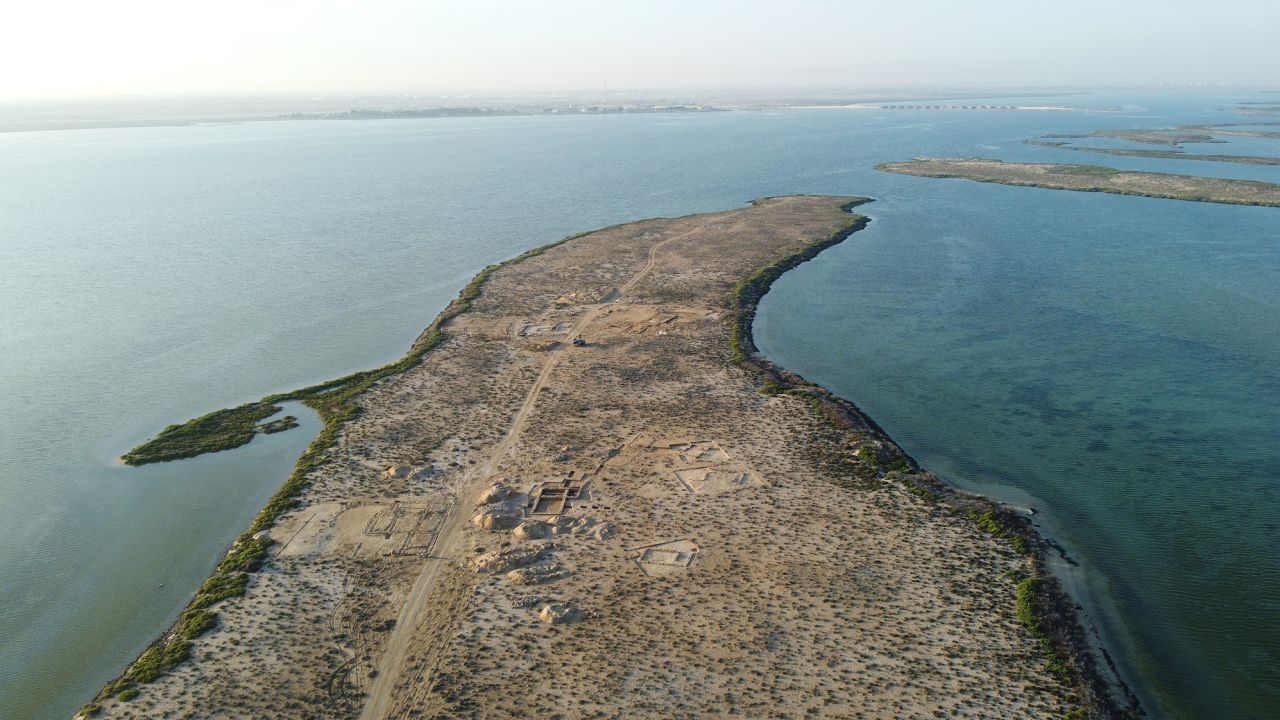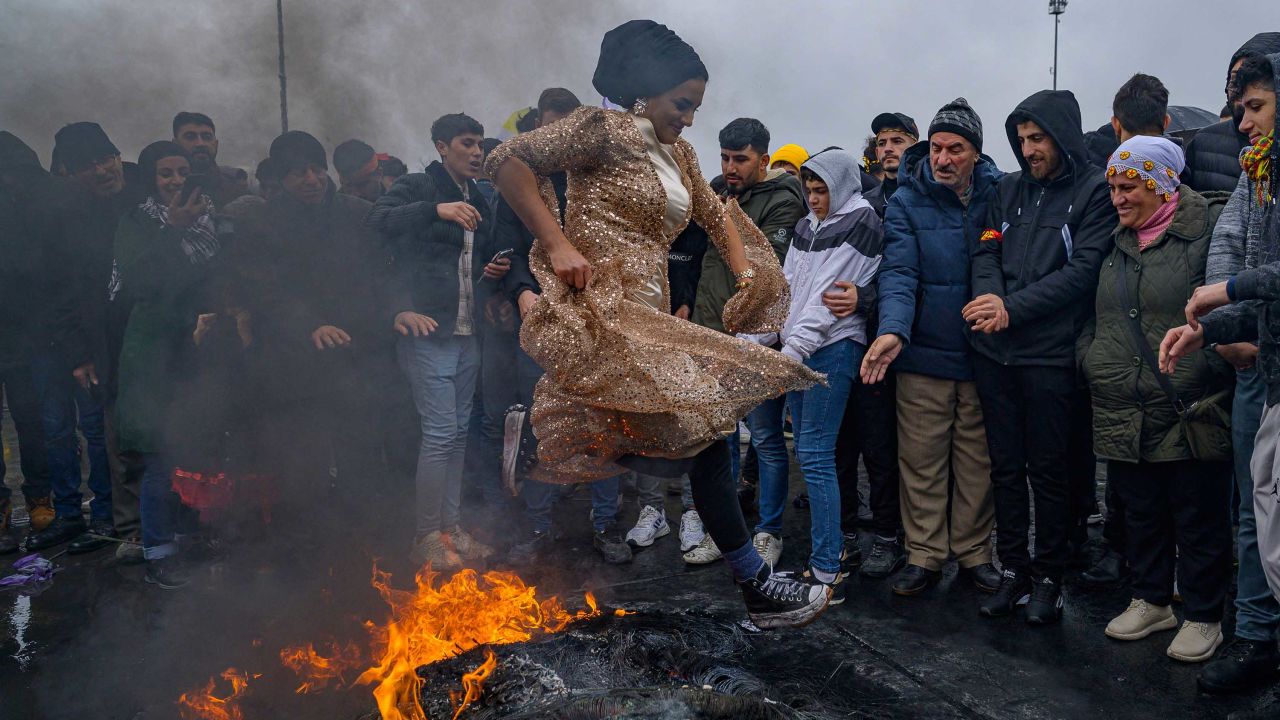
Editor’s Note: A version of this story first appeared in CNN’s Meanwhile in the Middle East newsletter, a three-times-a-week look inside the region’s biggest stories. Sign up here.
Dubai, UAE
CNN
—
Salah Nsaif was 32 years old when American soldiers imprisoned him in the notorious Abu Ghraib prison in Iraq in 2003.
Twenty years later, he has left his country and settled in faraway Sweden with his wife and three children, but the horrors of the war there continue to haunt him.
“What happened to me was very painful. It impacted my personal relationships when I left Iraq,” Salah told CNN, adding that he felt like he was in a prison of his own mind. “I didn’t want to see my baby or anyone else and I isolated myself. It took me a long time to stop having nightmares.”
Two decades after the start of the US-led war in the country, Iraqis say that while some of the physical wounds may have healed over time, the psychological trauma from the conflict and its aftermath persists to this day.
On March 20, 2003, US President George W. Bush announced the beginning of the invasion of Iraq under the pretext of disarming it from weapons of mass destruction, a claim that was later debunked.
The invasion of Iraq evolved into an eight-year occupation with American military bases, checkpoints and soldiers dotted all over the country. It was followed by a civil war and a brutal Islamist insurgency that saw Iraq overwhelmed by sectarian violence and communal divisions.
For Salah and his family, the scars of imprisonment are felt to this day, both physically and mentally.
He was stripped naked several times, deprived of food, beaten, taunted by dogs and kept in solitary confinement, he told CNN.
Seeking professional mental health treatment is less common in Arab countries than in Western societies due to a social stigma. That’s why Salah didn’t consult a psychiatrist, he said. Instead, he sought comfort from his family, but it wasn’t always easy.
“You know, in Iraq, we have this culture of not talking to a doctor or a psychiatrist. We don’t even think about it,” he told CNN. “I needed to get out of this circle of fear and anxiety and move forward. At home things were difficult during the first few years with my wife – she became like an alien to me.”
Salah was working as a journalist with the Qatar-based news channel Al Jazeera in Diyala, northeastern Iraq when US forces detained him.
He was never charged with a crime, according to Katherine Gallagher, a lawyer from the US-based Center for Constitutional Rights representing him in a 2008 lawsuit against a US government military contractor that was responsible for the interrogations in Abu Ghraib.
In the years that followed the invasion and the toppling of Saddam Hussein’s government, over 20,000 Iraqi prisoners of war were detained by US army officials.
Approximately 120,000 civilians were killed between the US military invasion and withdrawal, according to Iraq Body Count, an online database that tracks official statements, reports from hospitals and non-governmental organizations to document casualties from the Iraq war.
The Abu Ghraib prison scandal shook the world when it was exposed in 2004. Images of naked, leashed prisoners piled on top of each other in fetal positions as American soldiers smiled at the camera came to define the brutality of the war for many Iraqis.
“They would put a black bag over my head and force me to take my clothes off. They would leave me naked in my cell for days,” Salah said.
In the years that followed, documents that came to be known as the Torture Memos revealed such methods were authorized by the Bush administration under enhanced interrogation techniques. Human Rights Watch said this generally meant torture, sexual assault, and rape.
Abu Ghraib was first used by Hussein to detain Iraqis. The US military took over control from 2003 until 2006. Iraqi officials officially closed it in 2014.
Salah and his family immigrated to Sweden in 2017 and now hold Swedish citizenship. He and his children don’t talk about his ordeal. “They know what happened to me and that I was tortured… but never discussed the details. They just know it from Google.”
Alexandra Chen, a UK-based trauma specialist, told CNN that the trauma of war can be passed down generations, decades after the conflict ends.
“(If) one’s hypervigilance was a key element of them surviving a particularly traumatic period of their life,” she said, then that may “become methylated in your DNA so that your children and your grandchildren, in particular, have that ability to survive.”
Escaping these memories remains difficult for Salah. Twenty years later, he is still waiting for justice.
When the United States withdrew its forces from Iraq in 2011, many Iraqis thought it was the dawn of a new era, one that would heal the horrific remnants of war.
But by the end of that year, a fanatical militant group reemerged that would wreak havoc in the country and far beyond it. The Islamic State of Iraq and Syria (ISIS) had by 2014 taken over large swathes of Iraq and Syria, imposing its radical version of Islamic law in the territories it governed.
Abbas Al Duliami was five years old when the US occupied Iraq. He lived in Baghdad for the first few years until his family fled to Syria in 2007 to escape the carnage. Although he was young, he said he was robbed of a childhood.
Chen says this is prevalent in younger Iraqis.
“We assume that when they’re so young they don’t remember anything”, said Chen, adding that science shows the first five years of life are the most sensitive for brain growth.
Abbas returned to Baghdad with his family in 2011 hoping to start over, but ISIS threatened that new life with more upheaval, leading them to move again.
Now finishing his education in the United Arab Emirates, he said nightmares of war continue to haunt him.
“Growing up during these years was hard because I was a kid watching people being kidnapped or killed on the streets for years. It stays with me,” he told CNN.
For those who weren’t fortunate enough to escape, the trauma became a permanent part of their lives.
Ghofran Mohammed, 28, who still lives in Baghdad, was eight years old when the US invaded. She recalls watching soldiers arrest people daily.
She never spoke about the war with a mental health professional and said her family encouraged her to move on from the trauma.
“My parents told me to forget what I saw and continue my life and education after they saw I was traumatized,” she told CNN.
Chen, the trauma specialist, says children can absorb their parents’ distress when they start believing that they are the cause of the distress. That can affect their romantic relationships and their relationships with children, she says.
While therapy helps, she adds, it’s not the solution. “This is not rocket science. And the solution… in addition to the prevention of traumas, is for the wars to stop.”
Netanyahu government makes first climbdown on plan to weaken Israel’s judiciary
The government of Israeli Prime Minister Benjamin Netanyahu announced a change Monday to a key part of its controversial plans to overhaul the country’s judicial system. Opposition leaders inside and outside the legislature immediately rejected the proposed changes as insufficient. The concession would give Israeli governments less power to select new judges – but still more power than it has now. The lawmaker leading the overhaul process, Simcha Rothman, announced the change to government plans, and also said parliament would delay passage of other elements of the plan until after the parliament’s Passover holiday in April.
- Background: The original bill to change how judges are selected would have established a selection committee where coalition-appointed members would have a clear majority. The new plan reduces the power of the coalition, giving them a one-seat majority of appointed spots on the judge selection committee. In another concession, it says that once two supreme court judges have been appointed by the committee, further judges can only be selected by a supermajority of the committee.
- Why it matters: The change announced by the government marks its first climbdown in the face of massive public protests and international pressure. For months, hundreds of thousands of Israelis have regularly taken to the streets to protest the overhaul. They’ve been joined by senior figures in Israel’s security, high-tech, financial and academic fields. Leaders of the Israel’s allies, including the US and Germany, have also expressed concern, calling for “consensus” to be reached on the reforms instead of the government imposing unilateral measures.
Iranian president invited to visit Riyadh by Saudi king – Iranian official
Saudi Arabia’s King Salman bin Abdulaziz has written to Iranian President Ebrahim Raisi inviting him to Riyadh, Deputy Chief of Staff for Political Affairs to Iran’s President Mohammad Jamshidi tweeted on Sunday, adding that Raisi welcomed the invitation and stressed Iran’s readiness to expand cooperation. There has been no confirmation by Saudi Arabia of the letter or invitation. Separately, Iranian Foreign Minister Hossein Amirabdollahian said during a news conference on Sunday that the two countries had agreed to hold a meeting between their top diplomats.
- Background: On March 10, Saudi Arabia and Iran agreed to restore ties in a Chinese-brokered deal seven years after diplomatic relations were severed between the two countries. Riyadh cut ties with Tehran in 2016 after its embassy was attacked following the Saudi execution of a prominent Shiite cleric, Nimr al-Nimr.
- Why it matters: A rapprochement between Iran and Saudi Arabia could have a significant impact in calming regional tensions after decades of rivalry between the two that saw them engage in proxy conflicts in the Middle East. The Saudi finance minister said last week that it could even spur Saudi investment in Iran.
Yemen’s Houthis and government say prisoner exchange deal reached
The two sides in Yemen’s conflict on Monday said they had agreed to exchange some 880 detainees after talks in Switzerland facilitated by the United Nations and the International Committee of the Red Cross, Reuters reported. Yemen’s Iran-aligned Houthi group said it would release 181 detainees, including 15 Saudi and three Sudanese, in exchange for 706 prisoners from the government, according to statements on Twitter by the head of the Houthis’ prisoner affairs committee Abdul Qader al-Murtada and the group’s chief negotiator Mohammed Abdulsalam.
- Background: The exchange of around 15,000 conflict-related detainees has been under discussion as a key confidence-building measure under a December 2018 UN-mediated deal known as the Stockholm Agreement. UN special envoy Hans Grundberg told the UN Security Council last week that there were intense diplomatic efforts at different levels to end the fighting in Yemen.
- Why it matters: There is hope that a deal could facilitate broader efforts to end the hostilities, which have been helped by the resumption of ties between Iran and Saudi Arabia this month. The conflict in Yemen has widely been seen as a proxy war between Saudi Arabia and Iran.

A group of archeologists in the United Arab Emirates on Monday found what they believe to be the oldest pearling town in the Persian Gulf on Siniya Island, just east of the Umm al-Quwain emirate.
The 12-hectare (30-acre) town functioned between the late 6th and mid-8th centuries, predating the Islamic civilization, according to the Umm al-Quwain Department of Tourism and Archeology.
The findings show the town to be one of the “largest surviving urbanized settlements ever found” in what is today the UAE, and is believed to have housed thousands of residents, many of whom relied on the pearling industry. The houses were built from local beach rocks and materials from the surrounding environment and roofs were made of palm trunks.
While other pearling settlements are known to have existed in the region, this one is particularly unique, said Timothy Power, associate professor of archaeology at UAE University. Not only because of its age and size, but also because it was not seasonal, but rather operated year-round, he said.
“This is a different order of settlements, this is a proper town,” Power told CNN, adding that it was densely populated with a range of housing types, and included various socio-economic groups.
Residents of the town were likely Christian, as the settlement is located near an ancient Christian monastery that was discovered just last year, Power said.
The practice of pearling, where divers recover pearls from oysters or mussels from seas and lakes, has been part of the region’s heritage for more than 7,000 years, according to the Umm al-Quwain Department of Tourism.
“We know from historical clauses that there were other important pearling markets in this period,” Power said, but it was clear that pearling was a key industry for this town.
At peak times of the pearling market, huge numbers of people were involved in the industry, Power said. In neighboring Abu Dhabi, he added, almost two-thirds of the male population were involved in pearling in the 19th century.
By Nadeen Ebrahim

